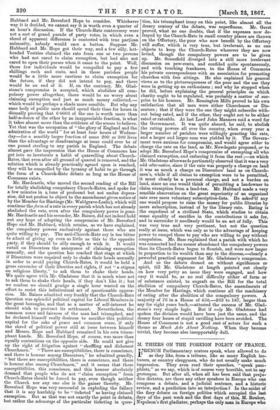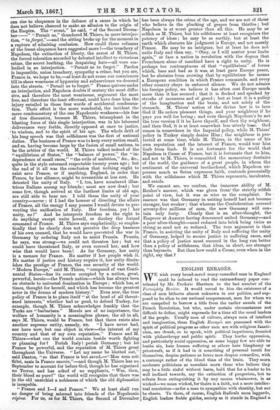M. TRIERS ON THE FOREIGN POLICY OF FRANCE.
URENCH Parliamentary orators speak, when allowed to do I' as they like, from a tribune, like so many English lec- turers, or country clergymen, who do not usually make much impression. They even read their speeches, "speak pam- phlets," as we say, which is of course very horrible, not to say grotesque. But after all, when all has been said that preju- dice dictates, are there any other speakers in Europe who can compress a debate, and a judicial sentence, and a historic review, and a prediction into an interjection? In the midst of the fiery debate on foreign politics which occupied the last days of the past week and the first days of this, M. Rouher, Napoleon's first gladiator, perhaps the only man in Europe who can rise to eloquence in the defence of a cause in which he does not believe, chanced to make an allusion to the origin of the Empire. The "event," he said, "of the Second Decem- ber—" "Permit us," thundered M. Thiers, in mere interjec- tion, " to forget,"—and the sitting broke up for the moment in a rapture of admiring confusion. How could three columns of the freest eloquence have suggested more ?—the treachery of Napoleon, the extinction of liberty, the arrest of M. Thiers, the forced toleration accorded by defeated intellect to victorious crime, the secret loathing, the despairing hate—all were em- bodied in an interjection. "Permit us to forget." Pardon is impossible, union treachery, sympathy a crime, but you are, France is, we hope to be,—at least do not rouse our consciences till in sheer weariness of hypocrisy and subservience we descend into the streets. "Permit us to forget." France quivers under an interjection, and Napoleon doubts if oratory the most diffu- sive, and therefore the most wearisome, argument the most free, and therefore the least effectual, could have done him the injury entailed in those four words of accidental condemna- tion. Their effect is the more wonderful, the incident the more condemnatory of the one Napoleonic weakness—his fear of free discussion, because M. Thiers, triumphant in the blasting force of this single interjection, was in his laboured deliverance very feeble, directly opposed at once to justice, -to wisdom, and to the spirit of his age. The whole drift of his long speech was that selfishness was the first of national duties. The business of France was to keep every nation small, and so, having become large by the fusion of small nations, to be the arbiter of the world. M. Thiers talked indeed of the "equilibrium of States," the "balance of power," the "in- dependence of small races," "the evils of ambition," &c., quite in the style esteemed respectable twenty years ago ; but the end of it all was the conclusion that nothing ought to exist save France, or if anything, England, in order that France, by her alliance, might be irresistible at less cost. He detested the unity of Italy. "I, too, have numbered illus- trious Italians among my friends ; most are now dead ; but some few, though arrived at the furthest limits of old age, are still able to hear me. I told them the unity of your country—never ; if I had the honour of directing the affairs of France, all the energy I may possess I would devote to pre- venting the unification of Italy. Her freedom, yes I her unity, no I" And he interprets freedom as the right to do anything except unite herself, or disobey the formal command of France. M. Thiers says emphatically, so empha- tically that he clearly does not perceive the deep baseness of his own counsel, that he would have prevented the war in Germany by ordering Italy not to assist Prussia. Prussia, he says, was strong—we could not threaten her ; but we could have threatened Italy, or even coerced her, and how wise that would have been! As for Germany, her unity is a menace for France. No matter if .her people wish it. No matter if justice and history require it, her unity dimin- ishes the prestige of France, the one security of the world. "Modern Europe," said M. Thiers, "composed of vast Conti- nental States—has its centre occupied by a nation, great, powerful, heroic—the French nation—which has always been an obstacle to universal domination in Europe ; which has, at times, thought for herself, and which has become the greatest *actor in the drama of modern history." Even now, the true policy of France is to place itself "at the head of all threat- ened interests," whether bad or good, to defend Turkey, for example, though M. Thiers acknowledges frankly that the Turks are "barbarians." Morals are of no importance, the welfare of humanity is a meaningless phrase, the all in all, says M. Thiers, would be France, but that there exists also another supreme entity, namely, Rm. "I have never had, nor have now, but one object in view—the interest of my country and that of my own reputation." France and M. Thiers—what can the world contain beside worth fighting or planning for ? Perish Italy! perish Germany; but let
France be powerful, and the reputation of M. Thiers great throughout the Universe. "Let my name be blotted out," said Denton, "so that France is but saved,—" Mon nom suit iletri, mais Is France sauvee,"—and though M. Thiers has no September to account for before God, though he has organized no Terror, and has asked of no suppliants, "Was, then, their blood so purer the world will recognize that there was in the old 'anarchist a nobleness of which the old diplomatist is incapable.
"France and I—I and France." We at least shall run no danger of being misread into friends of the Napoleonic re'gime. For us, as for M. Thiers, the Second of December
has been always the crime of the age, and we are not of those who believe in the plucking of grapes from thistles ; but. Napoleon is at worst greater than all this. He may be at selfish as M. Thiers, but his selfishness at least recognizes the potency of ideas ; he may be as earthly, but at least the earth which obscures his judgment is Europe, and not merely France. He may be an intriguer, but at least he does not unite Italy and then say, "Obey, or I will scatter your limbs again," or face a nation in revolution with the dogma that Frenchmen alone of mankind have a right to unity. He is perhaps too contemptuous of that "equilibrium" of forces which, base and bad as it was, at least gave Europe peace, but he abstains from avowing that by equilibrium he means a European condition in which France commands, and every other country obeys in enforced silence. We do not admire his foreign policy, we believe it has often cost Europe much more than it has secured ; that it is flecked and specked by streaks of meanness and of greed ; but at least it is a policy-- of the imagination and the brain, and not solely of the stomach. M. Thiers' notion of the divine law is to love God if He orders pleasant things, and your neighbour if he pays you well for loving ; and even though Napoleon's be not the true version if it be Love thyself, and then thy neighbour, and then God, it is at least somewhat less utterly base. God comes in somewhere in the Imperial policy, while M. Thiers' policy in Turkey simply denies Him ; the neighbour is pro- tected at some time, while M. Thiers, in the name of his own reputation and the interest of France, would tear him limb from limb. It is not fortunate for the world that Napoleon is Caner of France, but it is fortunate that to him, and not to M. Thiers, is committed the momentary destinies of the world, the guidance of a great people, in whom the sentiment of the universal brotherhood, which Napoleon ex- presses much as Satan expresses faith, contends perennially with the selfishness which M. Thiers represents, inculcates, and extols.
We cannot see, we confess, the immense ability of M. Rouher's answer, which was given from' the strictly selfish point of view, but it was as wise as the complaint. Its essence was that Germany in uniting herself had not become stronger, but weaker ; that whereas the Confederation covered- seventy-five millions of men, the new Germany will con- tain only forty. Clearly that is an after-thought, the Emperor at Auxerre having denounced united Germany—and a poor after-thought—mud reduced into brick being twice as strong as mud not so reduced. The true argument is that France, in assisting the unity of Italy and suffering the unity of Germany, helped to secure justice to suffering races, and that a policy of justice must succeed in the long run better than a policy of selfishness, that ideas, in short, are stronger than bayonets. But then how could a Czesar, even when in the right, say that ?































 Previous page
Previous page